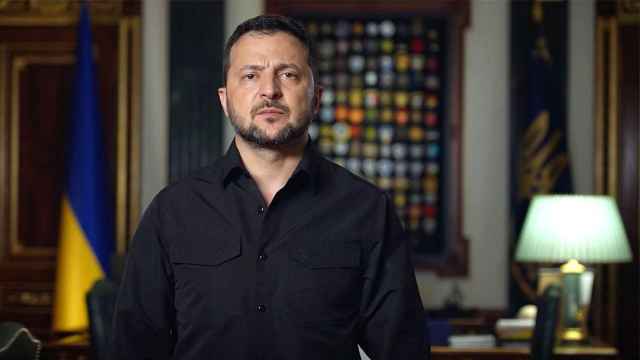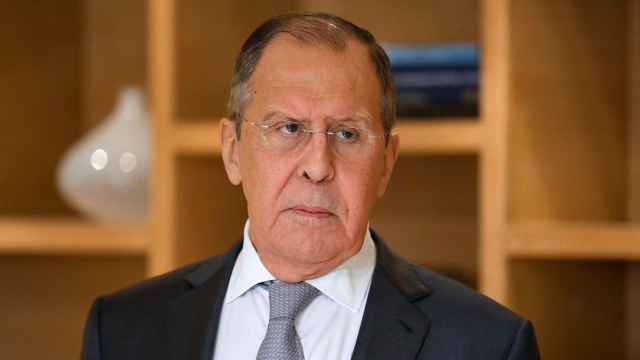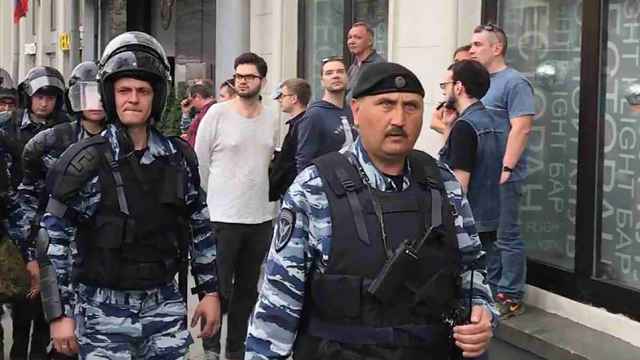As the Jan. 10 bilateral security talks between Russia and the U.S. approach — and with little idea as to how Russia’s unrealistic security demands could end in any kind of agreement — one possible Russian calculus is missing from Western analysis of Moscow’s intentions.
It's that the Kremlin actually believes Ukraine is planning a military seizure of Crimea and Donbass — where Russian-backed separatists have occupied territories for nearly eight years now — and Moscow is thus weighing options to pre-empt or respond to a potential offensive as it amasses troops on its south-western borders.
There has been a prevalent tendency in Western analysis to pin this Russian troop buildup — which began last spring and then renewed in earnest this fall — on a specific Russian goal of forcing guarantees of NATO non-expansion and then, in the event of a likely denial, using that as a pretext to invade Ukraine.
There are limits to what we can know about Russian intentions, especially given that Russian foreign policy, while aggressive, tends to be more reactive than proactive.
But one possibility that hasn’t really been factored into the various predictions of how Russia will act this winter is that the escalation is as much about Donbass as it is about NATO.
Consider last week’s comments by Foreign Minister Sergei Lavrov, who criticized the West for increasing weapons supplies to and conducting military drills with Ukraine. “The Kiev regime naturally perceives this support as a carte blanche for the use of force,” he said. “An adequate response will be given to any possible provocations by Kiev against Donbass.”
Such comments — especially taken with the recent uncharacteristically aggressive warnings of his deputy Sergei Ryabkov — could be dismissed as merely part of a control drama, a deception staged by Moscow to indicate it is serious. But why the additional explanatory rhetoric when its troop amassments alone are quite enough for heavy metal diplomacy, if that is indeed all this was?
Warning the West
Looking closely at the statements coming out of Moscow in recent months there has been a consistent strand where it essentially warns the West against backing a Ukrainian offensive.
On Nov. 18, a few weeks after reports began emerging about Russian troop buildup, Vladimir Putin made his now famous “red lines,” statement, widely seen as the first harbinger of Moscow’s ultimatum for a new European security architecture on its own terms. But in his speech, he identified “Ukraine’s internal crisis” and its “failure to fulfill [Minsk] obligations” as Russia’s most pressing security issue. The West was “exacerbating” the situation by supplying Kiev with weapons.
Putin quite clearly said “tensions should remain” — i.e. Russia would not deescalate — so long as there was risk of “them” — i.e. Ukraine and NATO — “staging some kind of conflict” on Russia’s western border.
Then on Nov. 24, Security Council head Nikolai Patrushev alleged that the “West destroyed” Ukraine’s economy; as a result the country could “set ablaze” causing a security crisis for Russia, with an influx of thousands of refugees.
It’s not clear how exactly Patrushev imagined Ukraine would “set ablaze,” and while Ukrainian domestic turbulence would affect the war in Donbass, it’s not easy to understand how this domestic turbulence would directly impact Russia’s security.
Unless, that is, one imagines a highly unlikely scenario in which Volodymyr Zelenskiy’s government collapses, nationalist hardliners take over, and, with NATO assistance in the form of lethal weapons, attempt to retake Crimea and Donbass by force.
Yet Ukraine has denied any such plans, while Zelenskiy has repeatedly affirmed his commitment to peace, all but ruling out any imminent military solution on Ukraine’s part. Why does Moscow, if its comments are genuine, continue to believe it?
However unlikely a hardline nationalist offensive against Crimea or the Donbass may be, the Russians' concerns in part reflect Ukrainian politicians' own rhetoric.
Two of Ukraine’s military commanders have openly threatened Russia with force. In June, former special operations commander Serhiy Kryvonos said Ukraine should be ready to strike Russia with a swift “knockout” once it is weakened. To be fair, he did say that until that opportunity arises Ukraine should demonstrate its commitment to a peaceful resolution of the Donbass conflict.
The current commander in chief of the armed forces, Valery Zalushny said in September that he'd like to drive a tank through Red Square. Granted, both these comments were made on prime-time public television — and the latter in response to a viewer’s question — but one would question the wisdom of trolling a powerful and paranoid neighbor that has a track record of taking such comments far too seriously.
But it’s not just the rhetoric that the Russians seem to be responding to. In their view, a vocal, nationalist minority in Ukraine has consistently stymied all of Zelenskiy’s efforts to follow the Minsk Package of Measures toward a peaceful solution to Donbass. Alas, they are not wrong. In March 2020, Zelenskiy’s chief of staff, Andryi Yermak, met with the Kremlin’s point man on the Donbass issue, Dmitry Kozak, and agreed on a special Advisory Council in which Ukrainian officials would discuss the peace process with representatives of the Russian-backed separatist governments. In return, he was slapped with criminal charges by the SBU. Discussing peace with separatist leaders – something specifically stipulated in the Minsk agreements which Kiev signed – was deemed tantamount to treason.
The charges didn’t go anywhere, but the damage was done. Talks ground to a halt. For Zelenskiy, any peaceful solution to Donbass seemed to have become toxic. To survive politically, he had to signal that he was determined to return Crimea — as with the summer 2021 creation of the Crimean Platform, intended to bring back the peninsula that Russia illegally annexed in 2014. The Russians seem to have read this as the final nail in the coffin of the Minsk agreement. Ukraine has no plan to follow through on peacefully reintegrating the statelets in Donbass. The only alternative, the Russians imagine, must be to retake the territories — as well as Crimea — by force.
This triggered a change in Moscow’s policy towards Ukraine, and the renewed troop buildup this fall appears part of that change. The new approach was formulated by Dmitry Medvedev, the deputy chairman of the security council who penned an uncharacteristically hawkish column arguing that Ukraine wasn’t a real country and therefore it was useless to talk to it. To get anything done, Russia deemed, it should really be seeking guarantees from the United States and NATO, and in Moscow’s view such adversaries only take force seriously.
Once again, however unrealistic — and possibly outright delusional, since neither Ukraine nor other NATO members are actually beholden to Washington — this view from Moscow is, it is also backed by history.
Georgia parallels
When a western-leaning politician, Mikheil Saakashvili, came to power in Georgia on the back of a popular coup in 2004, his first move was to try to rein in three pro-Russian separatist breakaway states — Adjara, South Ossetia, and Abkhazia as part of a wider bid of eventually joining NATO. Buoyed by the success of Adjara renouncing its separatist aspirations without a bullet being fired, and inspired by what he thought were promises of U.S. and NATO support, Saakashvili began to prepare to bring Abkhazia and South Ossetia back into the fold, this time militarily.
For four years, Russia prepared for and anticipated his strike. This mutual escalation — both political and military — culminated in the Russia-Georgia war of 2008, when Russian troops invaded Georgia, pushed it out of Ossetia and Abkhazia, and officially recognized the two breakaway states as independent.
Zelenskiy is no Saakashvili. He seems to have few illusions about NATO membership, and there is no real preparation in Ukraine to pull off what Saakashvili thought he could pull off in 2008. Moreover, both NATO and Washington have made it pretty clear that neither NATO nor U.S. troops would be fighting alongside Ukrainians in the event of a war with Russia.
But for the Russians, this message has not been clear enough. It has also been muddled by developments in Ukraine, where there is a consistent mismatch between what Zelenskiy is saying he is committed to on the one hand, and his administration’s actions and the hawkish threats made by some military officials and commentators on the other. There is a stated commitment to the peaceful reintegration of rebel-held territories in Donbass, but in practice any proposed plan by the Zelenskiy administration for actually doing so is stymied. Meanwhile, the focus remains on NATO and U.S. support for Ukraine in the form of lethal weapons and military advisers, and on other measures of deterrence against Russia.
These are all mixed messages in Russia’s view, and given that Ukraine doesn’t seem to have a plan on how to follow through on the Minsk agreement or work through the inherent inconsistencies in the document, Moscow seems to have chosen to operate on the assumption that while not necessarily imminent, a Georgian scenario is possible and even likely.
It is responding in kind. In September, I heard from a Kremlin adviser in the nationalist camp that Russia was preparing to officially recognize the statelets. At the time, I brushed aside the remarks as wishful thinking, but since then chatter to this effect has increased – not just among nationalist and patriotic outlets and experts, but in the more diplomatically oriented Russian International Affairs Council.
Recognition of the statelets is costly for Russia — it means giving up on the Minsk scenario of reintegrating them back into Ukraine and having to sponsor them forever, bearing the costs of additional Western sanctions. But the current stalemate — where Russia feels it has to support the statelets and be prepared indefinitely to defend them and their borders from what it believes to be an unstable and belligerent Ukraine — is also costly and unsustainable.
Now, according to a report last week in the respected Kommersant daily, government officials said that while Russia was not planning any unprovoked invasion, they were weighing recognizing the statelets and officially sending troops there in the event that talks with Washington fail to produce a satisfactory agreement.
No breakthrough
It is highly unlikely, if next to impossible, that the U.S. will agree wholesale to Russia’s shopping list, as Moscow has demanded. But while the new security architecture Russia is demanding doesn’t directly mention Donbass, it’s increasingly clear that the current escalation is about pushing for some kind of solution to the eight-year conflict — whether through a new security architecture, or, more modestly, through a new Minsk agreement that will be more palatable to Kiev than the current one.
In some ways, all that’s left for the United States to do is precisely what the Biden administration has taken to doing. No breakthrough is going to come from the Jan. 10 talks, but they are a necessary platform where U.S. officials can hear Russian concerns and hopefully dispel misconceptions about what the U.S. is prepared to do – and especially what the U.S. is not prepared to do – when it comes to supporting Ukraine. But when it comes to support, that support should be as much, if not more, about helping Ukraine decide on what it actually wants to do about Donbass, and stick to it, for the sake of its own safety and integrity, as it is about deterring Russia.
A Message from The Moscow Times:
Dear readers,
We are facing unprecedented challenges. Russia's Prosecutor General's Office has designated The Moscow Times as an "undesirable" organization, criminalizing our work and putting our staff at risk of prosecution. This follows our earlier unjust labeling as a "foreign agent."
These actions are direct attempts to silence independent journalism in Russia. The authorities claim our work "discredits the decisions of the Russian leadership." We see things differently: we strive to provide accurate, unbiased reporting on Russia.
We, the journalists of The Moscow Times, refuse to be silenced. But to continue our work, we need your help.
Your support, no matter how small, makes a world of difference. If you can, please support us monthly starting from just $2. It's quick to set up, and every contribution makes a significant impact.
By supporting The Moscow Times, you're defending open, independent journalism in the face of repression. Thank you for standing with us.
Remind me later.








